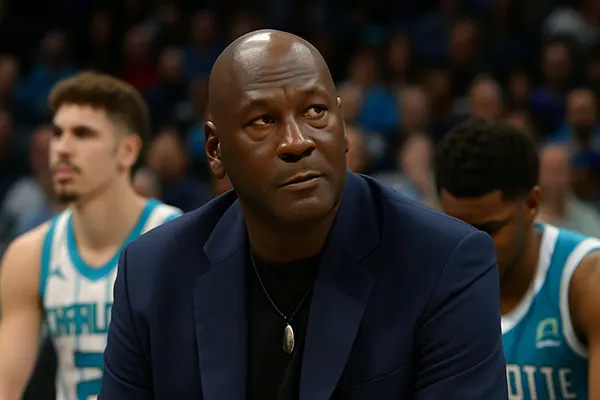
Michael Jordan as a Corporate Strategist: Leadership in Charlotte Hornets
Michael Jordan is globally renowned for his legacy as a basketball icon, but his career off the court, particularly as an executive and majority owner of the Charlotte Hornets, deserves deeper analysis. Over more than a decade, Jordan’s strategic influence has shaped the team’s branding, coaching direction, and draft policies. This article explores his evolution as a corporate strategist and decision-maker in the NBA, highlighting his unique blend of competitive mindset and business learning.
Draft Philosophy and Talent Acquisition Over the Years
When Jordan took over basketball operations in Charlotte in the mid-2000s, the Hornets’ draft selections often sparked debates. Critics pointed to early picks like Adam Morrison (2006) and others who failed to meet expectations. However, over time, Jordan’s front office adopted a more data-driven approach to drafting, signalling a shift from intuition to collaborative strategy involving scouts and analytics personnel.
One significant turning point came with the selection of LaMelo Ball in the 2020 draft. Despite concerns about Ball’s unorthodox path to the NBA, Jordan recognised his playmaking potential and marketability. This decision reflected a matured, risk-calibrated approach to team-building, aiming for long-term growth instead of short-term fixes.
Additionally, Jordan’s involvement in international scouting improved noticeably. The Hornets’ front office under his oversight expanded its focus to overseas talent, highlighting a strategic shift towards diversification in recruitment sources, allowing for a broader and often undervalued talent pool.
Shifting from Impulsive Picks to Strategic Planning
In his early years as an owner, Jordan’s competitive nature may have led to emotional or rapid decisions, including draft picks driven by personal impressions rather than team compatibility. Over time, however, the front office began conducting thorough evaluations, long-term planning, and better synergy with coaching staff in decision-making processes.
Today, Charlotte’s draft board reflects a structured hierarchy, balancing athletic ability with mental resilience and positional fit. Jordan appears to have recognised the value of patient development over headline-grabbing picks. This transformation showcases his willingness to evolve as a sports executive in a data-centric league.
The results are visible in how the Hornets have built a more coherent roster foundation. Though not always playoff contenders, the team shows more promise and long-term planning than during Jordan’s initial years in power.
Coaching Changes and Organisational Culture
Another pillar of Jordan’s strategic direction lies in his influence over coaching hires and internal culture. From Sam Vincent to Steve Clifford and James Borrego, each coaching choice reflects Jordan’s attempt to align team identity with leadership style. Early tenures saw less consistent results, but a shift toward developmental-focused coaching emerged by the mid-2010s.
Jordan’s approach has increasingly embraced player development and analytical coaching. Steve Clifford’s return in 2022 underscores this evolution. Clifford is known for his defensive structure and accountability, aligning with Jordan’s own values of effort, discipline, and fundamentals.
Internally, Jordan has encouraged a culture where performance is rewarded and effort is non-negotiable. Despite criticism of limited playoff success, his blueprint involves stability over impulsiveness, echoing corporate structures that favour long-term organisational health over short-term volatility.
Building a Culture of Accountability
One of the most underappreciated aspects of Jordan’s ownership is his insistence on accountability—something that mirrors corporate governance principles. Coaching staff are expected to uphold a clear standard of preparation, effort, and communication. This standard trickles down to players and support staff alike.
Jordan has backed coaches with time and resources to develop young talent, resisting calls for quick firings or high-profile replacements. This level-headedness stands in contrast to many NBA franchises that operate under volatile decision-making pressures.
His presence—often more subdued in recent years—nonetheless remains symbolic. Players are aware that the greatest of all time watches from above, which adds a layer of motivation and scrutiny uncommon in other markets.

Brand Strategy and Business Footprint
Beyond the court, Jordan’s business sensibility has shaped the Hornets’ branding and commercial strategies. The rebranding from Bobcats to Hornets in 2014 was a masterstroke in rekindling fan loyalty and historical identity. It reinforced the brand’s emotional ties to Charlotte’s basketball roots, boosting ticket sales and merchandise revenue.
Jordan’s Jordan Brand affiliation also played a unique role in marketing. While not fully integrated into Hornets operations, the association added prestige to the franchise. The visibility of Jordan’s image and reputation indirectly benefited sponsorships, fan engagement, and media attention.
Moreover, his focus on local community involvement through the Hornets Foundation reflects a modern corporate social responsibility approach. From education to racial justice initiatives, Jordan’s strategy connects sports success with societal impact, creating a multi-dimensional brand presence for the team.
Leveraging Legacy for Commercial Growth
Jordan’s global fame offers an asset no other NBA owner possesses. He has utilised this strategically, inviting business partnerships and expanding the team’s brand beyond North Carolina. Appearances at marquee events and selective media interactions have added gravitas to the Hornets without overexposing the brand.
In addition, sponsorship and arena upgrades under his tenure reflect steady growth in the business arm of the franchise. From partnerships with tech firms to fan experience innovations, the Hornets have become more than just a mid-tier basketball team—they’ve evolved into a regional sports brand with business momentum.
His corporate legacy now intertwines performance, reputation, and business integrity. While not every decision has yielded success, the overarching trajectory affirms that Jordan isn’t just an icon on posters—he’s a hands-on executive with an evolving understanding of organisational leadership.
